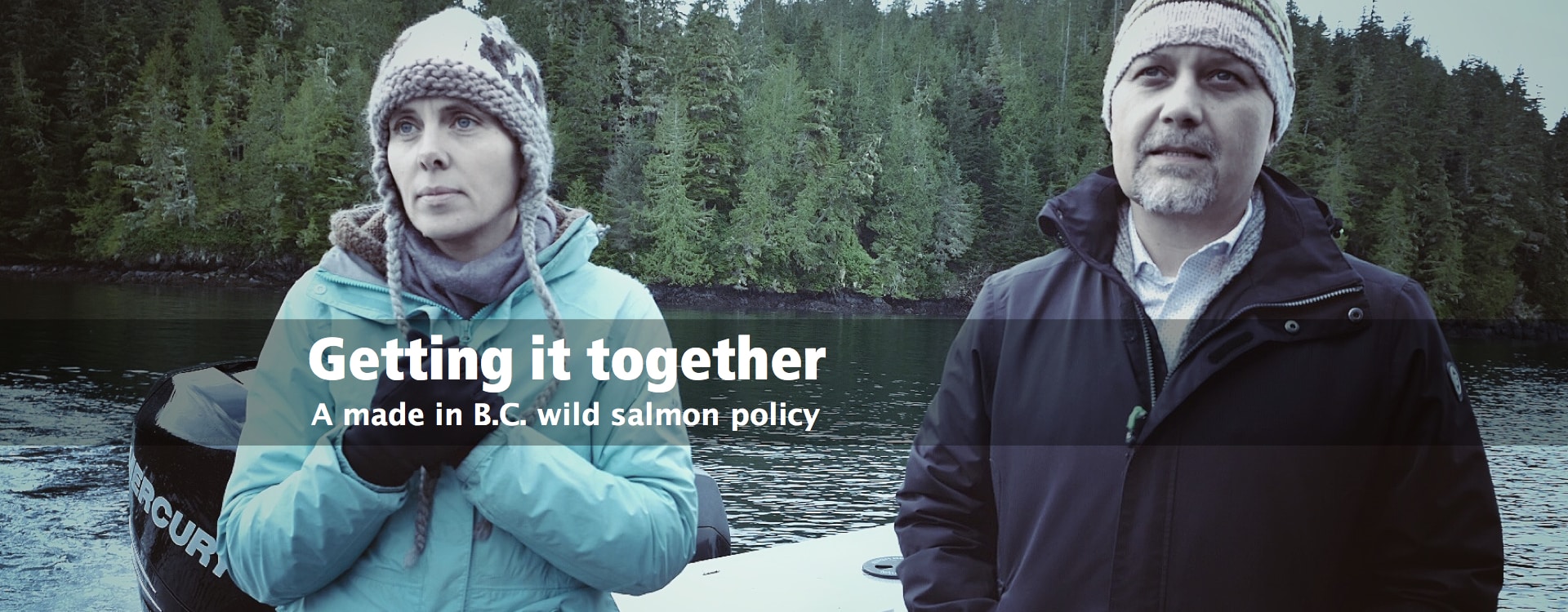Fragmented wild salmon policy
Wild salmon policy at the provincial level is fragmented. Multiple ministries make decisions that affect the wild Pacific salmon. But, there is no one body that has wild salmon at the centre of their decisions.
Both the federal and provincial governments have been perpetually studying, reporting and recommending. Yet, fish stocks are still collapsing across the province.
Decisions about agricultural practices, community development, forestry, mining, and roads and infrastructure all deeply affect wild salmon habitat. Without coordination, the result is chaos. But, good wild salmon policy is good economic, social and environmental policy. So, we have to do better.
There was a time when we had a Minister of Fisheries and policy-making was more centralized at the provincial level. When the B.C. Liberals gained power in the early 2000’s they dismantled Fisheries Renewal BC and the fish farm industry became the sole focus of the government.
Having a vision
As then Minister responsible, John VanDongen stated,
“Our vision for the direction we should take in the fishery is somewhat different [from the NDP’s.] It’s a vision that includes a greater emphasis on aquaculture and it’s a vision that includes a great emphasis on private enterprise.”
The B.C. Liberals wholeheartedly embraced the approach that VanDongen articulated. No longer was anyone in government responsible for developing policy with wild salmon at the centre. The once abundant salmon runs were already in decline and now there was no captain at the wheel. In addition, indigenous and coastal communities that relied on the salmon were abandoned. It was intentional.
Addressing the broad policy challenges
So, the work that I and my B.C. Green colleagues focussed on throughout this spring legislative session was to unpack the bureaucratic confusion. In short, we are committed to fixing the broad policy challenges. We focus on a vision of better economic, social and environmental prosperity for coastal communities.
The result of our efforts this spring was a report in which we recommend government establish a Wild Salmon Secretariat or Commissioner. The office must have a mandate to establish better coordination, communication and a comprehensive wild salmon policy.
To that end, the B.C. government has created the Wild Salmon Advisory Council. We are excited that they have accepted the challenge of protecting wild salmon. There are many stakeholders. It is critical that we bring them together to collaborate and crowd-source solutions for wild salmon.
Strong opposition to open net-pen fish farms
At the same time, we recognize that we must also address specific, timely and urgent issues. One such example, is our ongoing advocacy to get fish farms out of our coastal waters (see below).
We have been abundantly clear that we do not support the open net-pen industry. And, we remain strongly opposed. Our work was to highlight that just as VanDongen clearly stated a vision for the future of salmon on our coast, this government can also clearly state a different vision. And, it needs to do so, urgently.
So, we have to address the damage that fish farms are doing to wild salmon stocks, and the evidence continues to grow. But, we also have a responsibility to deal with the broad challenges as well. How we build our communities, roads and infrastructure, how we treat the creeks, streams, rivers, lakes, watersheds and estuaries, agricultural, mining and forestry practices must become more sustainable.
Speak with a powerful voice
Also, we have to deal with the federal Department of Fisheries and Oceans. To address that mess, the province must organize. The numerous stakeholders must be in alignment, working together and speaking with one powerful voice.
Undoubtedly, many British Columbians hoped that the announcement yesterday was about the cancellation of fish farm tenures in the Broughton Archipelago. It was not, and fish farms remain a pressing issue for the B.C. NDP government.
The B.C. Green Caucus is steadfast in our opposition. So, we stand with the Musgamagw Dzawada̱ʼenux̱w communities who want fish farms out of their territory. We support the Wild First, Safe Salmon and SeaLegacy campaigns. We commit that this will continue to be our message to government.
But, as the B.C Green critic for Agriculture, Forests, Lands, Natural Resources and Rural Development, Indigenous Relations and Reconciliation, Municipal Affairs and Housing, and Transportation and Infrastructure, I will also continue to work at the broad policy level to ensure we are better organized, coordinated, and have a coherent executable plan to protect and enhance wild salmon in British Columbia.
B.C. Green Caucus advocacy to remove open net pen fish farms
This is a list of some of the advocacy work that the B.C. Green Caucus has done on fish farms in recent month.
- May 27, 2015 – Andrew Weaver – Petitioning government re: open-pen fish farms on sockeye salmon migration routes
- September 13, 2017 – Andrew Weaver – Fish Farms and the need to protect wild salmon
- October 17, 2017 – Sonia Furstenau – Sonia Furstenau’s question on wild salmon to the Premier
- November 29, 2017 – Sonia Furstenau – Question the government on fish farm blood water
- January 24, 2018 – Adam Olsen – The Pacific salmon collapse and fish farm frustration
- February 27, 2018 – Andrew Weaver – Outrageous responses to simple questions about open net fish farms on BC coast
- March 4, 2018 – Adam Olsen/Georgia Strait – Green MLA Adam Olsen says it’s time to get Atlantic salmon out of B.C. waters
- April 5, 2018 – Adam Olsen/BC Green Caucus Press Release – Olsen: B.C. chefs’ call for end to open net-pen salmon farming demonstrates economic, cultural imperative to act – Adam Olsen/CBC – Fish farm companies should be required to First Nations approval, B.C. advisory council recommends
- April 26,2018 – Adam Olsen – Protecting wild salmon and fish farms transition plan
- May 7, 2018 – Adam Olsen – Supporting the future of commercial fishing in British Columbia


0 Comments